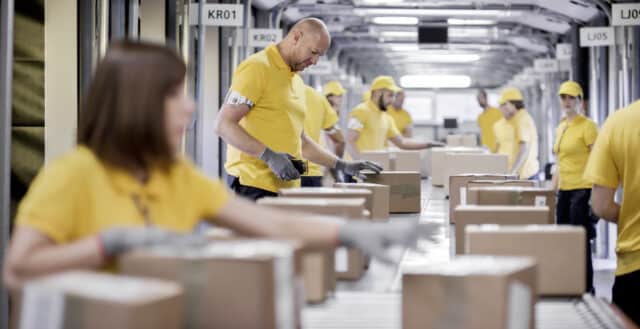
In the modern world, we need constant access to food, medicines, office equipment, tech, cars, building materials – you name it, we need it. To get those things in a timely fashion, we’ve built an intricate web of supply chains, to seamlessly deliver products across vast distances and meet our everyday demands. This complex operation is powered by the logistics industry, which ensures that goods flow quickly and efficiently, down the line; from manufacturers, to distributors, and into the hands of consumers (or businesses – depending on the product).
If this whole process interests you and you’d like to be involved in these often delicate operations, with many moving parts, then it may well be worth considering working in logistics. But, of course, you can’t make such a decision without being informed. And that’s what this blog post aims to do: arm you with all of the facts to be sure of whether a logistics career is for you. So, we’ll look to cover the various roles and career paths you can take in the UK logistics industry (namely, what are logistics jobs?), how to start a career in logistics, the key skills required for a successful career in logistics, the training and continual learning you’ll need to undertake to keep up to speed with industry changes, and, overall, how to carve out your niche in this sector. So, read on for more insights.
What are logistics jobs?
What types of roles are available in logistics, and are they right for me?
If you’re wondering about career paths in logistics or what a logistics career entails, then it’s worth noting that the logistics sector offers a wide range of routes you can take, encompassing different roles – each with its unique responsibilities and challenges. Let’s take a closer look at some of the those key roles that aspiring professionals, such as yourself, can pursue:
1. Freight and transportation
Transportation serves as the lifeblood of the logistics industry: it couldn’t run without it. Professionals in this part of the chain play a crucial role in coordinating the movement of goods via air, sea, road, or rail. There are many individual roles in this arena; from dispatchers who ensure timely pickups, to route planners optimising delivery routes, through to freight brokers negotiating transportation contracts. Just for clarity, ‘freight’ simply means any goods transported in bulk, by any means. But, regardless of meanings, this area of logistics is all about making sure goods move efficiently across the country, and beyond.
2. Supply chain management
Supply chain management is every bit as important to the logistics industry as freight and transportation, so supply chain work offers great career opportunities. Those who work in this particular field oversee the entire process of bringing products to where they need to get to – from raw materials to the finished product, in the hands of consumers. They optimise systems and processes, manage suppliers, and ensure seamless collaboration among various stakeholders in the supply chain.
3. Inventory management 
Well-planned inventory management is a vital component of any successful logistics operation. Those working in this role focus on maintaining optimal inventory levels i.e. ensuring that stock of items is managed efficiently so that there’s no running out of items, or the opposite – an excess of items ordered. Those involved in this part of logistics skillfully balance consumer demands with cost-effective management.
4. Warehousing and distribution
A well-organised warehouse is key to any large-scale logistics operation. Warehouse managers run the show on these sites, and are responsible for the efficient storage, organisation, and distribution of goods – ensuring maximum productivity and minimum wastage. They oversee the timely fulfillment of orders, accurate inventory tracking, and the smooth functioning of the warehouse, from top to bottom – as well as having responsibility for a number of warehouse operatives who work under them.
5. Procurement and sourcing
When it comes to logistics career paths, taking up a role in procurement and sourcing is certainly something worth thinking about. Procurement specialists play a pivotal role in the logistics industry, by managing the sourcing and purchasing of materials required for the production of goods that will make it to consumers. To work in this field, you need to be able to negotiate with suppliers and make strategic procurement decisions to support the seamless flow of goods to market.
6. Customs and compliance
This is one of the trickier roles when looking at working in logistics, as it involves having up-to-date knowledge of certain rules and regulations, in order to navigate the complex landscape of international trade. As a customs and compliance professional, it’s your responsibility to ensure that goods move smoothly across borders while adhering to various customs laws. You’ll need a degree of initial training to get to grips with all these laws, and will need to top up your knowledge at various points across your career.
7. Last-mile delivery and e-commerce logistics
The rise of online shopping has highlighted the significance of last-mile delivery in the logistics industry. Last-mile logistics refers to the final stage of the delivery process, where goods are transported from a distribution centre, or local hub, to the ultimate destination, which is often the customer’s doorstep. This phase of the logistics journey is critical as it directly impacts customer satisfaction and plays a significant role in shaping the overall customer experience, and their views of particular brands (and, therefore, the reviews they’re likely to give them). Last-minute logistics experts manage efficient delivery routes, control delivery strategies, and ensure flawless customer service.
How to start a career in logistics
Starting a career in logistics is an exciting journey, filled with opportunities, but also one that requires work on your part in terms of making your way into the industry. Here are a few things you can do if you want to pursue this new career…
Consider a relevant educational background in the industry
This could include studying for a degree in logistics, supply chain management, or business, such as this one, from the University of Hull. It’s also worth looking at getting certification from regulatory bodies, like the Chartered Institute of Logistics (CILT), to give you more credibility. Gaining strong foundational knowledge will lay the ground for a long and fruitful career.
Look at internships and entry-level positions
Internships and entry-level positions with logistics companies will give you practical experience of the industry, and all that goes on within it – and the skills you’ll need to make it work for you.

Network, network, network
Networking is invaluable when it comes to ‘getting in there’ in the logistics sector. Attend industry events, seminars, and workshops to connect with industry professionals and stay on top of the latest trends and information.
Keep learning
Continuous learning is essential, as the logistics landscape evolves rapidly. For example, as mentioned above, you’ll need to know all the latest international trade laws if you want to work in customs and compliance. Staying informed about new technologies and practices will only enhance your career prospects.
Set clear goals
To embark on a successful logistics career, you’ll need to set clear goals, be adaptable, and seize opportunities to showcase your skills and commitment to working in the industry. If you were looking at the warehousing and distribution side of logistics, you may well start as a warehouse operative, but a realistic goal could be; ‘I want to be a warehouse manager within the next five years.’At Indeed Flex we have roles available in the warehouse, so you can gain that experience and see if it’s for you. Ultimately, the dynamic logistics industry offers a rewarding career path for anyone with the passion and determination to succeed.
What are the skills required to be a success in the logistics industry?
When considering whether logistics offers a good career, it’s worth thinking about the particular skills and qualities that are of paramount importance in this industry. These will include hard skills (the ability to use certain key software, for example) and soft skills, such as being organised. The key attributes mentioned below will help you to navigate the industry as a logistics professional, and should lead to success and career advancement.
Problem-solving and critical thinking
The logistics industry is a dynamic one, and professionals often encounter unexpected challenges. For example, what happens if you can’t source materials from your usual go-to suppliers? The ability to analyse these challenges or situations critically, and come up with effective solutions quickly, is essential.
Attention to detail and organisation
Precision and accuracy are highly valued in the logistics sector, particularly when we’re talking about a supply chain with many moving parts, or working in inventory management and making sure you have neither too much nor too little by way of stock. Attention to detail and organisational skills ensure that operations run smoothly and efficiently, across all areas of logistics.
Communication and collaboration
Effective communication and collaboration skills are crucial in an industry that involves coordination among various teams, departments, and external partners.A breakdown in communication or collaboration between any of those involved in the logistics chain, could have knock-on effects, such as the late arrival of essential goods (in the field of healthcare or medicine, for example). Clear communication allows smooth interactions all the way down the line, and minimises misunderstandings and errors.
Technical skills
This is the ‘hard skills’ bit, we mentioned…The ability to work with certain technology is vital for a successful career in the logistics industry. Familiarity with logistics software, data analysis tools, and emerging technologies like artificial intelligence and blockchain are a must, and will give you the edge in this competitive arena.
Adaptability and flexibility
The logistics industry, both in the UK and worldwide, is constantly changing and evolving, to incorporate or adapt to new laws, new technologies, new processes, new ways of doing business. The rise of e-commerce, and the effect that’s had on the industry, is testament to this. Therefore, logistics professionals who can adapt to these changes swiftly and adjust their approach accordingly are the ones who will thrive in this dynamic, ever-changing environment.
So, is a career in logistics for you?
As we hope you’ve learnt, by reading this post, a career in logistics goes way beyond the mere movement of goods — it’s about working within a system, or chain, with multiple moving parts, where the efficient use of processes and technologies is a must. It’s an industry that, ultimately, drives economies and impacts lives – from families doing their food shopping, to individuals awaiting hospital treatment, to businesses waiting for essential parts to build their products. Whether you’re drawn to the fast-paced world of transportation, the more strategic approach required for supply chain management, or the intricacies of customs and compliance, there’s a path for you. Equip yourself with the right skills, knowledge, and mindset, and you’ll be well on your way towards a successful and fulfilling logistics career. With determination and commitment, you’ll flourish in this dynamic and essential industry. Best of luck!
Download the Indeed Flex app today and benefit from a world of temporary work opportunities across all different industries and employers.








